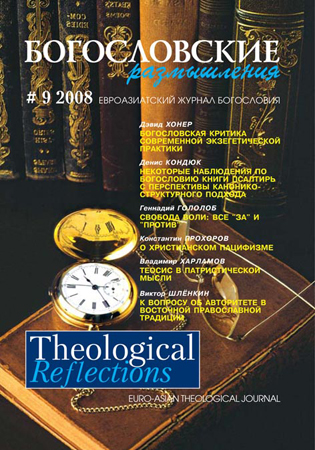Theosis in Patristic Thought
Keywords:
Theosis, Pseudo-Dionysius the Areopagite and Maximus the Confesso, essence and energyAbstract
In the current renewal of interest in the deification theme, the consensual and homogeneous character of this concept among early Christian writers is generally assumed. This article concisely examines the intricate complexity of the emergence and development of theosis in patristic theology, acknowledging the initially marginal, rhetorical, multi-dimensional, and often contextualized role of this concept prior to its theological consolidation in Pseudo-Dionysius the Areopagite and Maximus the Confessor in the sixth and seventh centuries. Important to Palamite and Neo-Palamite Eastern Orthodox theology, the distinction between the divine essence and energy is not necessarily a representative characteristic of the early church fathers.Downloads
How to Cite
Issue
Section
License
Copyright (c) 2020 Vladimir KHARLAMOV

This work is licensed under a Creative Commons Attribution-NonCommercial 4.0 International License.
All articles published in the Journal are distributed under a Creative Commons Attribution-NonCommercial 4.0 International License
By submitting an article for publication in Theological Reflections: Eastern European Journal of Theology the author grants the editors the right to publish the article and distribute it in electronic and print form.
The author reserves all copyrights and the right to use the materials of the article in whole or in part for educational purposes, to write his own dissertations, to prepare abstracts, conference reports, oral presentations, etc., as well as post electronic copies of articles (including the final electronic version downloaded from the journal’s official website) on non-commercial web-resources without the consent of the editorial board and founders.



